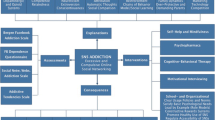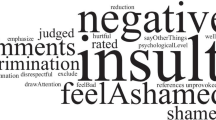Abstract
Three experiments conducted in China and the US investigated the impact of state anxiety on behavioral procrastination. Participants were induced into a high- or a low-anxiety state and then given a period of 12 min either to practice for an upcoming test or entertain themselves (e.g., watch videos). The results showed that participants in a high-anxiety state spent more time practicing for the upcoming test than participants in a low-anxiety state. Impulsivity and trait procrastination were also measured. Impulsivity was found to be positively correlated with both trait procrastination and dilatory behavior. Overall the findings support a self-regulatory theory account such that the negative emotion associated with anxiety motivates people to increase the effort towards reaching a goal and take proactive measures for the most important task, thus reducing procrastination.

Similar content being viewed by others
Notes
Compared to Experiment 2, Experiment 1 has larger SD of State Anxiety in low anxiety condition, and lower mean score of State Anxiety in high anxiety condition, which caused the smaller effect size of State Anxiety.
Levene’s Test for Equality of Variances was significant; the adjusted t test is reported.
Ratio of male versus female undergraduate students is 4:6 in this institution.
The model was also significant when using the entire sample, F (8, 94) = 2.91, p < .01, adjusted R 2 = .13. Controlling for other factors, Experienced Anxiety was significant, t (94) = 3.28, p < .01. The interaction term between Gender and State Anxiety is also significant, t (94) = −2.00, p = .05. Other factors were not significant.
References
Aitken, M. (1982). A personality profile of the college student procrastinator. Doctoral Dissertation, University of Pittsburgh, Dissertation Abstracts International, 43, 3A.
Balkıs, M. (2011). Academic efficacy as a mediator and moderator variable In the relationship between academic procrastination and academic achievement. Eurasian Journal of Educational Research, 45, 1–16.
Bandura, A., & Locke, E. A. (2003). Negative self-efficacy and goal effects revisited. Journal of Applied Psychology, 88(1), 87–99.
Bar-Haim, Y., Kerem, A., Lamy, D., & Zakay, D. (2010). When time slows down: The influence of threat on time perception in anxiety. Cognition and Emotion, 24(2), 255–263.
Bar-Haim, Y., Lamy, D., Pergamin, L., Bakermans-Kranenburg, M. J., & van Ijzendoorn, M. H. (2007). Threat-related attentional bias in anxious and nonanxious individuals: A meta-analytic study. Psychological Bulletin, 133(1), 1–24.
Bateson, M., Brilot, B., & Nettle, D. (2011). Anxiety: An evolutionary approach. The Canadian Journal of Psychiatry, 56(12), 707–715.
Beck, A. T., & Clark, D. A. (1997). An information processing model of anxiety: Automatic and strategic processes. Behaviour Research and Therapy, 35(1), 49–58.
Beede, D., Julian, T., Langdon, D., McKittrick, G., Khan, B., & Doms, M. (2011). Women in STEM: A gender gap to innovation (ESA issue brief# 04-11). Washington, DC: US Department of Commerce.
Bui, N. H. (2007). Effect of evaluation threat on procrastination behavior. Journal of Social Psychology, 147(3), 197–210.
Burka, J., & Yuen, L. (1983). Procrastination: Why you do it, what to do about it. Reading, MA: Addison-Wesley.
Carver, S. C., & Scheier, F. M. (1998). On the self regulation of behavior. Cambridge: Cambridge Univeristy Press.
Chen, X. L., Dai, X. Y., & Dong, Q. (2008). Research on application of Aitken Procrastination Inventory in under graduate students. China Journal of Clinical Psychology, 08(01).
Cisler, J. M., & Koster, E. H. W. (2010). Mechanisms of attentional biases towards threat in anxiety disorders: An integrative review. Clinical Psychology Review, 30(2), 203–216.
Dai, X. Y. (2010). ChangYong XinLi PingGu LiangBiao ShouCe. Peiking: People’s Military Medical Press.
Else-Quest, N. M., Hyde, J. S., & Linn, M. C. (2010). Cross-national patterns of gender differences in mathematics: A meta-analysis. Psychological Bulletin, 136(1), 103–127.
Ferrari, J. R., O’Callaghan, J., & Newbegin, I. (2005). Prevalence of procrastination in the United States, United Kingdom, and Australia: Arousal and avoidance delays among adults. North American Journal of Psychology, 7(1), 2–6.
Fritzsche, B. A., Young, B. R., & Hickson, K. C. (2003). Individual differences in academic procrastination tendency and writing success. Personality and Individual Differences, 35(7), 1549–1557.
Gregersen, T., & Horwitz, E. K. (2002). Language learning and perfectionism: Anxious and non-anxious language learners’ reactions to their own oral performance. The Modern Language Journal, 86(4), 562–570.
Haghbin, M., McCaffrey, A., & Pychyl, T. A. (2012). The complexity of the relation between fear of failure and procrastination. Journal of Rational Emotive and Cognitive Behavior Therapy, 30, 249–263.
Hartley, C. A., & Phelps, E. A. (2012). Anxiety and decision-making. Biological Psychiatry, 72(2), 113–118.
Ho, H., Senturk, D., Lam, A. G., Zimmer, J. M., Hong, S., Okamoto, Y., et al. (2000). The affective and cognitive dimensions of math anxiety: A cross-national study. Journal for Research in Mathematics Education, 31, 362–379.
Jaccard, J., Turrisi, R., & Wan, C. K. (1990). Interaction effects in multiple regression. Newbury Park, CA: Sage.
Judith, L. J., & Bloom, A. M. (1995). An analysis of the contribution of the five factors of personality to variance in academic procrastination. Personality and Individual Differences, 18, 127–133.
Lavoie, J. A., & Pychyl, T. A. (2001). Cyberslacking and the procrastination superhighway a web-based survey of online procrastination, attitudes, and emotion. Social Science Computer Review, 19(4), 431–444.
Lay, C. H. (1986). At last, my research article on procrastination. Journal of Research in Personality, 20(4), 474–495.
Lay, C. H., Edwards, J. M., Parker, J. D., & Endler, N. S. (1989). An assessment of appraisal, anxiety, coping, and procrastination during an examination period. European Journal of Personality, 3(3), 195–208.
Lay, C. H., & Silverman, S. (1996). Trait procrastination, anxiety, and dilatory behavior. Personality and Individual Differences, 21(1), 61–67.
Lee, J. (2009). Universals and specifics of math self-concept, math self-efficacy, and math anxiety across 41 PISA 2003 participating countries. Learning and Individual Differences, 19, 355–365.
Lowe, P. A. (2015). Should Test Anxiety be Measured Differently for Males and Females? Examination of Measurement Bias Across Gender on Measures of Test Anxiety for Middle and High School, and College Students. Journal of Psychoeducational Assessment, 33(3), 238–246.
Marks, I. M., & Nesse, R. M. (1994). Fear and fitness: An evolutionary analysis of anxiety disorders. Ethology & Sociobiology, 15(5–6), 247–261.
McCown, W. G., & Johnson, J. L. (1991). Personality and chronic procrastination by university students during an academic examination period. Personality and Individual Differences, 12, 413–415.
McCown, W., Petzel, T., & Rupert, P. (1987). An experimental study of some hypothesized behaviors and personality variables of college student procrastinators. Personality and Individual Differences, 8(6), 781–786.
Milgram, N., & Toubiana, Y. (1999). Academic anxiety, academic procrastination, and parental involvement in students and their parents. British Journal of Educational Psychology, 69(3), 345–361.
Mowrer, O. H. (1939). A stimulus-response analysis of anxiety and its role as a reinforcing agent. Psychological Review, 46, 553–565.
Nunnally, J. C., & Bernstein, I. H. (1994). Psychometric theory (3rd ed.). New York: McGraw-Hill.
Öhman, A., Flykt, A., & Esteves, F. (2001). Emotion drives attention: Detecting the snake in the grass. Journal of Experimental Psychology-General, 130(3), 466–478.
Onwuegbuzie, A. J. (2004). Academic procrastination and statistics anxiety. Assessment & Evaluation in Higher Education, 29(1), 3–19.
Park, S. W., & Sperling, R. A. (2012). Academic procrastinators and their self-regulation. Psychology, 3(01), 12.
Patton, J. H., Stanford, M. S., & Barratt, E. S. (1995). Factor structure of the Barratt Impulsiveness Scale. Journal of Clinical Psychology, 51(6), 768–774.
Powers, W. T. (1973). Behavior: The control of perception. Chicago: Aldine.
Pychyl, T. A., & Flett, G. L. (2012). Procrastination and self-regulatory failure: An introduction to the special issue. Journal of Rational-Emotive & Cognitive-Behavior Therapy, 30, 203–212.
Raghunathan, R., & Corfman, K. P. (2004). Sadness as pleasure-seeking prime and anxiety as attentiveness prime: The “Different Affect-Different Effect” (DADE) Model. Motivation & Emotion, 28(1), 23–47.
Rodarte-Luna, B., & Sherry, A. (2008). Sex differences in the relation between statistics anxiety and cognitive/learning strategies. Contemporary Educational Psychology, 33(2), 327–344.
Sarason, I. G., & Stoops, R. (1978). Test anxiety and the passage of time. Journal of Consulting and Clinical Psychology, 46(1), 102–109.
Schouwenburg, H. C. (1992). Procrastinators and fear of failure: an exploration of reasons for procrastination. European Journal of Personality, 6(3), 225–236.
Senécal, C., Koestner, R., & Vallerand, R. J. (1995). Self-regulation and academic procrastination. The Journal of Social Psychology, 135(5), 607–619.
Sharma, L., Markon, K. E., & Clark, L. A. (2014). Toward a theory of distinct types of “impulsive” behaviors: A meta-analysis of self-report and behavioral measures. Psychological Bulletin, 140(2), 374.
Solomon, L. J., Murakami, J., Greenberger, C., & Rothblum, E. D. (1983). Differences between high and low procrastinatiors as a deadline approaches: A qualitative study. Unpublished manuscript, University of Vermont, Burlington, USA.
Solomon, L. J., & Rothblum, E. D. (1984). Academic procrastination: Frequency and cognitive–behavioral correlates. Journal of Counseling Psychology, 31(4), 503–509.
Spada, M. M., Hiou, K., & Nikcevic, A. V. (2006). Metacognitions, emotions, and procrastination. Journal of Cognitive Psychotherapy, 20(3), 319–326.
Spielberger, D. C., Gorsuch, R. L., Lushene, R., Vagg, P. R., & Jacobs, G. A. (1983). Manual for the State-Trait Anxiety Inventory (Form Y). Palo Alto, CA: Consulting Psychologists Press.
Stainton, M., Lay, C. H., & Flett, G. L. (2000). Trait procrastinators and behavior/trait-specific cognitions. Journal of Social Behavior and Personality, 15, 297–312.
Steel, P. (2007). The nature of procrastination: A meta-analytic and theoretical review of quintessential self-regulatory failure. Psychological Bulletin, 133(1), 65–94.
Steel, P. (2010). The procrastination equation: How to stop putting things off and start getting stuff done. New York: HarperCollins.
Tice, D. M., Bratslavsky, E., & Baumeister, R. F. (2001). Emotional distress regulation takes precedence over impulse control: If you feel bad, do it! Journal of Personality and Social Psychology, 80(1), 53–67.
Tooby, J., & Cosmides, L. (2008). The evolutionary psychology of the emotions and their relationship to internal regulatory variables. In M. Lewis, J. M. Haviland-Jones, & L. F. Barrett (Eds.), Handbook of emotions (3rd ed., pp. 114–137). New York, NY: Guilford Press.
Van Eerde, W. (2003). Ameta-analytically derived nomological network of procrastination. Personality and Individual Differences, 35(6), 1401–1418.
Walsh, J. J., & Ugumba-Agwunobi, G. (2002). Individual differences in statistics anxiety: the roles of perfectionism, procrastination and trait anxiety. Personality and Individual Differences, 33(2), 239–251.
Wittmann, M., & Paulus, P. M. (2007). Opinion: Decision making, impulsivity and time perception. Trends in Cognitive Sciences, 12, 7–12.
Zhen, X. H., Shu, L., & Zhao, J. F. (1993). STAI testing report in Changchun. Chinese Mental Health Journal, 7(2), 60–62.
Zillman, D. (1988). Mood management through communication choices. American Behavioral Scientist, 31(3), 327.
Author information
Authors and Affiliations
Corresponding author
Rights and permissions
About this article
Cite this article
Xu, P., González-Vallejo, C. & Xiong, Z.H. State anxiety reduces procrastinating behavior. Motiv Emot 40, 625–637 (2016). https://doi.org/10.1007/s11031-016-9554-x
Published:
Issue Date:
DOI: https://doi.org/10.1007/s11031-016-9554-x




